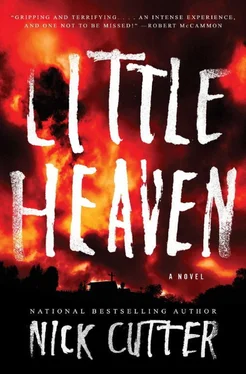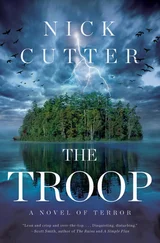“How bad do you figure things are?” said Minerva, joining him.
Micah said, “Bad.”
They dropped their packs off at their bunkhouse. Their weapons they kept. Finding nobody about, Micah wandered to the edge of Little Heaven while Minerva changed into fresh clothes.
The children’s playground sat forlorn in the dusk. Micah sat on one of the swings and watched the torches bob through the forest. The sky was the red of a blood blister, the sun’s final rays pooling behind the trees. He had never been scared of nightfall. Even as a child, he’d welcomed the darkness. But bad things tended to happen at night in Little Heaven. Those same terrible things might happen in the day, too, soon enough. But at least they would be able to see them coming.
Ellen Bellhaven appeared on the other side of the fence. Her clothes were smudged with dirt and sap.
“Hey,” she said to Micah.
“Hey.”
She entered through the gates and sat on the swing beside him. Her eyes were encircled by dark rings like washers. A goose egg sat high on her forehead.
“Were you hit?” Micah said.
She nodded. Rage flared inside him. She put a hand on his shoulder.
“I’m fine,” she said, and related the morning’s events. Micah closed his eye and rocked on the swing.
“How many this time?”
“Three children. Two brothers and a little girl,” Ellen said. “And Eli’s gone again, too. We’ve been searching all day. I’m worried.”
“Yes.”
“I can’t see things getting any better.”
“No.”
“This isn’t about Nate anymore. We should all get out. Every person here.”
“There was a chance we could have. But now… the kids.”
Ellen nodded. “We can’t leave without them. It would be…” She sighed. “Hate to use the word, but it would be un-Christian of us.”
“The Reverend?”
“I don’t know how much power his word holds anymore,” Ellen said. “People are scared, Micah. Really, really scared.”
Micah felt that fear seeping out of the woods, where all of Little Heaven was searching for those kids. He could almost smell it coming out of Ellen’s pores, too. He had known that fear himself, years ago. It was kindling in him again now.
Fear finds a home in you. That was a lesson Micah had learned at some price. It finds the softest spots imaginable and sets up residence. That place behind your knees where the nerves bundle up, buckling them. Inside your lungs, pinching the air out of them. Within your head, spreading like fungus. Fear will make you abandon those you care for, even those you claim to love—the people you tell yourself you’d save, sacrificing your body for theirs, if it ever came to that. And hypothetically, yes, you would… at least in those dream scenarios we all concoct. The burning houses, the crazed gunmen. You’d risk that heat or take that bullet. In a man’s fantasies, he always does the right thing.
But sometimes a man must face the absolute reality of his fear. And he’ll discover that terror can chew him up and turn him into something else. A monster of wrath, or of cowardice. That man finds himself inhabiting the skin of a total stranger… except not really. It is the creature he becomes in the pressure cooker. Fear can warp a man. Turn him into a repellent specimen whom he never thought he could be, not in a million years.
Micah knew. He’d seen it. He’d lived it.
In the summer of 1953, a month before the war ended, Micah had found two American soldiers torturing a Korean POW. The incident was being overseen by Captain Luker Beechwood, Micah’s commander. Beechwood was the classic southern dandy. The sort of man whose father drank sweet tea on the porch of the plantation manor where his forebears had had their slaves whipped in the dooryard.
The POW was a kid, eighteen. He was strapped to a chair with baling twine inside an isolated shack on the edge of their encampment. The soldiers were busily cutting pieces of skin off his chest and arms. The POW’s trousers were soaked with blood, and snot was bubbling out of his nose.
“We’re just letting some air into him, Private,” Captain Beechwood told Micah.
The soldiers were from Micah’s unit. One was Lyle Sykes. Fat, suffering from trench foot. He had a furtive and rattish air despite his girth. He was the sort of soldier whose skull you considered clandestinely putting a bullet into, out of the sense that he was somehow more dangerous than the enemy. Declan Hooper was the other man. A good egg. Micah was not surprised to see Sykes at the scene of this atrocity, but Hooper was a shock.
A sack sat at Captain Beechwood’s feet. Inside, Micah caught the gleam of wire cutters, a hammer, some nails. The air was hot inside the shack, filled with the reek of blood.
Micah said: “This is not to code.”
Micah was twenty. He had grown up rough, and by then had done some rough business himself. But what was happening in the shack had nothing to do with the war. Micah understood that Beechwood and the other two men could have as easily done the same to a US soldier if they thought they could get away with it.
“Private Shughrue,” Beechwood said in his plummy southern twang, “this man has information of a vital nature. We are simply endeavoring to extract it.”
Micah regarded them. Sykes, beefy and beady-eyed. Hooper, looking like a boy caught filching dimes from his mother’s purse. But what Micah recalled powerfully was a personal dryness: his own fear leeched the moisture out of his eyes and nose and mouth, his veins running thick as if his blood had been mixed with flour.
“You cannot,” he said more firmly.
Beechwood smiled. “We are , and we will .”
With that, Micah hit his CO in the face. Beechwood’s nose cracked and he fell back with a squawk. The Korean soldier moaned. Hooper and Sykes came on next, clouting Micah with closed fists. Micah fought back, but one of them clipped his chin and sent him crashing to the ground. Beechwood had recovered by then. They all put it to him, stomping his skull with their heavy mud-caked boots.
“Enough,” Beechwood announced, panting. “We’ll kill him. Can’t get away with that.”
They dragged Micah to the brig, where he was imprisoned for assaulting his commanding officer. One month in a lightless cell, fed bread teeming with lice. By the time he got out, Captain Beechwood and the others had shipped out. He never knew what became of the Korean soldier.
Once home, Micah nursed fantasies of hunting Beechwood down and doing to his former commander what Beechwood had done to the Korean. But Micah’s tendency to square the scales was not so strong then. And anyway, some part of him understood the impulse. The three of them had been scared deep in their souls. Fear manifested in terrible ways, especially during wartime. It shows a man the face he didn’t know he had. Later Sykes and Hooper might have been remorseful—Hooper especially—waking with nightmares about what they had done. Beechwood, probably not. All men are built to different tolerances. Put in identical straits, they react differently. And those who act rightly despite that crawling fear cast shame upon those who cave in to it.
Quite simply, you never really know what type of person you are. Micah understood that now. A man never can tell which side of the line he lives on. He will exist forever ignorant until that moment—ruinous and unflinching—when he is forced to confront his hidden inner self.
“Did you get everything from the camp?” Ellen asked, snapping Micah back to the present. Off Micah’s nod, she said, “Any problems?”
“We saw something.”
“What?”
“Some… creatures” was all Micah could say.
“Animals?”
“Not quite.”
Читать дальше












